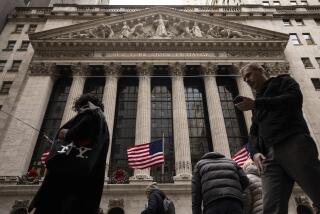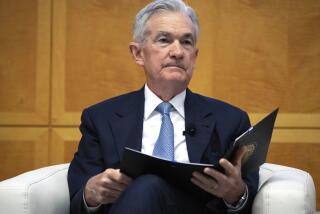Another year of economic shortfalls predicted
A third consecutive year of massive federal deficits and a slumping economy with high unemployment portrays a bleak fiscal outlook for the U.S., promising a divisive political debate this fall over how to get the country back on track.
The Congressional Budget Office said Wednesday the federal deficit was projected to hit $1.3 trillion in fiscal 2011, the third year of shortfalls at levels not seen since World War II.
As the economy continues to struggle, unemployment is expected to remain stubbornly high through the end of the year, but dip to 8.5% as the 2012 election approaches, a slight improvement but still high and on par with previous projections by the congressional agency. Polls show jobs remain a top priority for Americans.
Both Democrats and Republicans seized on the report as Congress and President Obama prepare to battle anew over the best approach to improve the economic outlook while reducing the nation’s debt.
GOP leaders said the report offered more evidence that the Obama administration’s fiscal policies had been a failure. “Where are the jobs?” asked House Speaker John A. Boehner (R-Ohio).
Democrats said it showed the troubled economy could no longer afford tax breaks for the wealthy that expire next year. “The most effective way to reduce our deficit is to put Americans back to work and grow our economy,” said Rep. Nancy Pelosi (D-San Francisco), the House minority leader.
Obama is expected to ask Congress for new measures to create jobs — possibly by extending payroll tax breaks, offering companies tax credits for adding employees, and by investing in roads, bridges and school construction projects.
Those options will cost money, and Obama has called for an approach that simultaneously tackles deficits by cutting federal spending elsewhere and increasing tax revenue.
Economists generally support that two-step remedy as appropriate for the times: fiscal stimulus in the short term to keep the economy from slipping further, alongside a long-term plan to reform tax and spending policies to reduce the debt load.
Republicans, though, are in no mood for compromise. Fresh from holding the line on new taxes during the debt ceiling debate, the GOP is pursuing a vision of government that relies on larger tax breaks, spending cuts and regulatory relief to fuel economic growth.
One point is clear: To continue business as usual in Washington would lead to a “bleak” economic outcome, said Douglas W. Elmendorf, director of the Congressional Budget Office.
The dour outlook gives more urgency to the congressional “super committee” on deficit reduction — the new panel that skeptics say will be unlikely to reach a bipartisan agreement in its remaining 10 weeks of work. It has not yet held its first meeting, but on Wednesday its co-chairs, Sen. Patty Murray (D-Wash.) and Rep. Jeb Hensarling (R-Texas), said they were working to ensure the committee “is given every opportunity to succeed.”
The committee is tasked with cutting $1.5 trillion from deficits over the next decade through spending cuts, new taxes or a combination of both. If it cannot agree on a proposal for Congress to consider, as many think is likely, automatic spending cuts of a similar size would be triggered, though they would not take effect until 2013. A committee website to take public input could be launched in days.
But the debate over whether to increase taxes has vexed Washington. The tax breaks enacted under the George W. Bush administration expire at the end of 2012, and keeping all of them in place would add about $4 trillion to the deficit over 10 years.
Deficits would plummet in 2013 if all of the Bush-era tax cuts expired, but that is unlikely, as most of the tax breaks go to middle-class families and have bipartisan support. The upper-income tax cuts, though, remain a political dispute.
“There’s absolutely no doubt there are profound budget challenges and profound economic challenges,” Elmendorf said Wednesday.
The budget office said the record deficits over the last three years stemmed from the “long shadow” cast on the economy from the financial crisis and recession.
Deficits ballooned as the federal government spent money to shore up the economy with the stimulus program, industry bailouts and aid for unemployed Americans. Deficits also rose as tax revenue dropped substantially. The Congressional Budget Office’s estimated deficit for 2011 is actually a slight dip from earlier projections.
Part of the problem that lawmakers face in tackling budgetary issues is that their options become increasingly limited as the economy struggles and the fiscal problems deepen, experts say.
For example, the budget accord reached this summer to raise the debt ceiling will help to substantially reduce the nation’s future debt load by reducing spending, the report said.
But slashing federal outlays also causes short-term pain as the economy struggles to grow. Federal budget cuts are “weighing on output and employment,” Elmendorf said.







